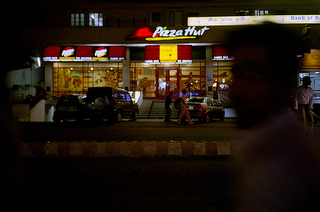In Parts 1 and 2 of this series, I defined consumer culture and then discussed some of the consequences of finding an identity within a consumer society that is characterized by a rapidly shifting, and therefore unstable, system of cultural meanings. But what does all of this have to do with India? The obvious answer is that inasmuch as India continues down the path of a consumer society, citizens in India will increasingly take on all of the problems with consumerism as a form of social organization that were discussed in Part 2.
In this installment, I want to explore whether there is any evidence of concern among Indians about the transition to a consumer culture. I think there is evidence, modest though it may be. To illustra
 te, let me turn to Chetan Bhagat's One Night @ The Call Center, a fictional book about six employees at Gurgaon call center. The book, which is a bestseller in India, is less about life working in a call center, and more a vehicle for the author to critique India's headlong rush into consumer capitalism. For a summary, see here. For blogger reviews, see here
te, let me turn to Chetan Bhagat's One Night @ The Call Center, a fictional book about six employees at Gurgaon call center. The book, which is a bestseller in India, is less about life working in a call center, and more a vehicle for the author to critique India's headlong rush into consumer capitalism. For a summary, see here. For blogger reviews, see hereAt the corner of Sahara Mall we passed by a Pizza Hut. It was closed. Vroom went up and stood in front of it. I wondered if he had really gone crazy; was he expecting pizza at this time?As a sociologist, I am interested in the reasons for this book’s popularity. The success of the author’s first book, Five-Point Someone, offers a partial explanation. Another explanation is that there is a message that resonates with readers at some level. Vroom is speaking for a segment of the population that is disillusioned with global capitalism’s promise that consumer culture is India’s economic salvation.
We stood near the entrance. On our right, there was a thirty-foot wide metal hoarding of a cola company. A top Bollywood actress held a drink bottle and looked at us with inviting eyes. Like a fizzy drink was all it took to seduce her into bed.
Vroom walked close to the actress’s face.
‘What’s up dude?’ I said.
‘You see her?’ Vroom said, pointing to the actress.
I nodded.
‘There she is, looking at us like she is our best friend. Do you think she cares for us?’
‘I don’t know. She is a youth icon man,’ I shrugged my shoulders.
‘Yes, youth icon. This airhead chick is supposed to be our role model. Like she knows a fuck about life and gives a fuck about us. All she cares about is cash. She doesn’t care about you or me. She just wants you to buy this black piss,’ Vroom said, pointing to the cola bottle. (p. 211-212)
Near the end of the book, Vroom speaks even more explicitly for his generation, the “youth generation:”
The government doesn’t care for anybody … Even that “youth special” channel, they don’t care either. They say youth because they want the damn Pizza Huts and Cokes and Pepsis of the world to come and give their ads to them. Ads that say if we spend our salary to have pizza and coke, we will be happy. Like young people don’t have a fucking brain. Tell us what crap to have and we’ll have it. (p. 213)And then, in a speech aimed at saving the call center from lay-offs that Vroom and Shyam’s manager calls “rightsizing,” Vroom offers what could be considered a rallying cry for his generation:
My friends, I am angry. Because every day, I see some of the world’s strongest and smartest people in my country. I see all this potential, yet it is all getting wasted. An entire generation up all night, providing crutches for the white morons to run their lives. And then big companies come and convince us with their advertising to value crap we don’t need, do jobs we hate so that we can buy stuff—junk food, colored fizzy water, dumbass credit cards and overpriced shoes. They call it youth culture. Is this what they think youth is about? Two generations ago, the youth got this country free. Now that was something meaningful. But what happened after that? We have just been reduced to a high-spending demographic. The only youth power they care about is our spending power. (p. 253)
Now back to my point. Vroom’s concern has to do with the potential for the lure of consumer luxuries to stifle the talents and promise of an entire generation of Indians. For me—and I’ll admit I am merely someone with some training to understand social organization and social change who also happens to have lived in India for six months—the problem with consumer capitalism is the way in which it forces the transformation of certain existing cultural traditions in the interest of expanding markets to meet the system’s demand for constant growth.
I understand that this is sensitive terrain I am now treading. I certainly do not mean to romanticize India or its culture. Nor do I want to lump all Indians into one category. But there seems to be no denying that consumer capitalism is brining changes to India. Indeed, every Indian I spoke to about these matters admitted that India is experiencing rapid change. The changes will mean different things for different people, depending on who you are or where you fit into the cultural mosaic of India. Ultimately, every Indian should be asking “What will the future India look like if change continues to be driven by a market orientation rooted in the culture of consumption?”
I’ll offer one possible answer to this question in the next installment of “Consumerism in India: A Faustian Bargain?”
Technorati tags: consumerism, Indian culture





No comments:
Post a Comment